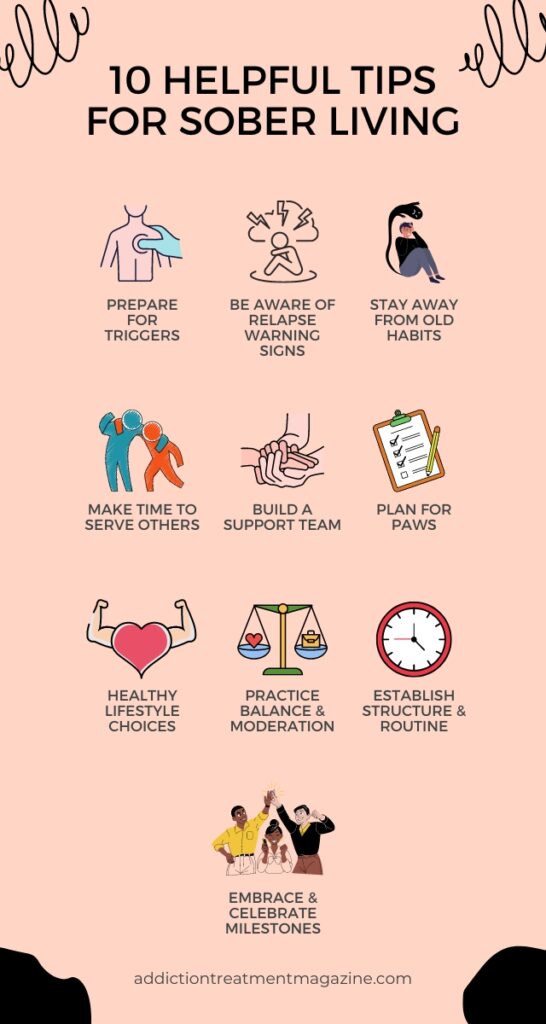Admitting you have a problem and getting sober are the first steps to recovery, but staying sober is just as important. Whether you are thinking about yourself or a loved one, it is never too early to think about life after detox and rehab. Some may argue that staying sober is just as challenging as getting sober, but in a different way. This is why it is important to take it one day at a time and accept help from others. Tomorrow is always a new day with unique opportunities and challenges. As you make your way through the recovery process, consider the following tips for sober living:

Recognize & Prepare for Triggers
Every individual has unique triggers that may challenge their sobriety. Identify these triggers and try to develop a plan to avoid them as best possible. Of course, it may not be possible to avoid the triggers completely. For that reason, be prepared for them and have a plan of what to do when they present. The best option is usually to remove yourself from the triggering situation or circumstances, if possible. Have someone to call or a coping mechanism to help keep you focused on your sobriety. Common triggers include:
- Financial issues
- Problems at work
- Relationship issues
- Stress
- Other people drugging or drinking
Be Aware of Relapse Warning Signs
Relapses don’t always happen out of the blue. In fact, there are a number of signs indicating a possible relapse that may present hours, days, or weeks before actually relapsing. If you can recognize these signs as they are happening, then you can take action to get your mind, body, and soul back on the right path and avoid a relapse. Possible early relapse warning signs include:
- An increase in feelings of anxiety and anger
- Isolation, not asking for help, or not going to support group meetings
- Unhealthy eating and sleeping habits
- Nostalgic thoughts of past drug & alcohol use
- Lying to about your thoughts or actions
- Creating a plan to relapse
Stay Away From Old Habits
Speaking of triggers and relapse warning signs, old habits can be a major trigger and sign of a possible relapse. Giving into old, unhealthy habits like going to bars and staying up late is one of the riskiest things to do while in recovery. This includes spending time around people you used to use with and places you used to use at. If you used to drink at a bar on your way home from work, consider taking a new route home. If you always used to drink while tailgating at football games, avoid going to football games and go to the beach or pool instead. Sober living means making new, healthy habits that fill the time you previously spent engaging in substance use.
Make Time to Serve Others
When working to develop new healthy habits and hobbies for sober living, volunteering should be a top consideration. Some options include volunteering at your local church, soup kitchen, or youth center. Spending time volunteering not only provides a sense of self-worth and fulfillment, but it also provides perspective. It can be so easy to become so focused on our own issues that we forget those around us are also struggling with their own demons. Just as your support team is helping you, you do have the ability to help others in your community.
Build A Support Team
Sober living is not easy on your own. Support systems play a critical role in short term and long term sobriety. Your support system may include friends, family, therapists, support groups, or any number of people. Just be vigilant that the people you let in truly do have your best interest at heart and that they support your recovery. These will be the people you call when you are living a sober life and encounter a trigger or experience a possible relapse warning. Having someone to talk to just may be the difference between continuing to live sober and relapsing.
Plan for PAWS
PAWS, or post-acute withdrawal symptoms, is a condition in which some withdrawal symptoms linger for several months. In some cases, these symptoms can last over a year or two while slowly tapering off. PAWS is a harsh reality for many people who are going through the first year or so of sober living. Symptoms may include anxiety, depression, and insomnia. Being aware of these symptoms, working with your recovery team, and makings healthy lifestyle changes can help manage or reduce the symptoms of PAWS.
Engage in Healthy Lifestyle Choices
Your physical health is connected with your mental and emotional well being. For instance, exercise triggers the releases of endorphins and other hormones connected with creating pleasure and happiness. Also, eating healthy gives your body the nutrients and energy it needs to think sharp and heal any damage caused by previous substance use. Making these healthy choices can actually reduce the length of time that PAWS symptoms are experienced. Additionally, activities such as yoga have been shown to help improve mindfulness, balance, strength, and overall wellbeing.
Practice Balance & Moderation
Life is all about moderation. Too much of anything can be dangerous, especially for an addict. Even exercising too much and not eating enough can be a sign of another type of disorder that is very similar to drug addiction: an eating disorder. As someone who may present more risk factors for addiction, practicing moderation will be paramount to avoiding new addictions.
Establish Structure & Routine
Building new habits take time, which is why the structure and routine that a drug and alcohol rehab program provides is beneficial for someone beginning to live a sober life. Take advantage of the structure provided while in rehab and use this to model your routine after rehab. Keeping to a routine helps avoid those bad habits and personal triggers.
Embrace & Celebrate Milestones
Be proud of every day of sobriety under your belt. Celebrate your 30, 60, and 90 days sober with your support group and invite your loved ones to join in. Living a sober life is something to be proud of. You may be surprised how much joy it brings not only to you but to your friends and family as well. It also shows others in recovery that if you can do it, they can too.
The actions you take can build upon themselves, leading you in a negative or positive cascade. Once you make one healthy choice, making the next healthy choice becomes easier and easier. However, this is also true the other way around. Keep these tips in mind and understand how powerful each decision you make can be when it comes to sober living.

